Francisco de Aguilar (born 1810 in Comayagua [ citation needed ]) was President of Honduras (acting): 8 November 1855 - 17 February 1856. [1]
Francisco de Aguilar (born 1810 in Comayagua [ citation needed ]) was President of Honduras (acting): 8 November 1855 - 17 February 1856. [1]

Central America is a region of the Americas. It is bordered by Mexico to the north, Colombia to the southeast, the Caribbean Sea to the east and the Pacific Ocean to the west and south. Central America consists of seven countries: Belize, Costa Rica, El Salvador, Guatemala, Honduras, Nicaragua and Panama. Their combined population is estimated at 44.53 million (2016).

Honduras, officially the Republic of Honduras, is a country in Central America. The republic of Honduras is bordered to the west by Guatemala, to the southwest by El Salvador, to the southeast by Nicaragua, to the south by the Pacific Ocean at the Gulf of Fonseca, and to the north by the Gulf of Honduras, a large inlet of the Caribbean Sea.
The economy of Honduras is based mostly on agriculture, which accounts for 14% of its gross domestic product (GDP) in 2013. Leading export coffee (US$340 million) accounted for 22% of total Honduran export revenues. Bananas, formerly the country's second-largest export until being virtually wiped out by 1998's Hurricane Mitch, recovered in 2000 to 57% of pre-Mitch levels. Cultivated shrimp is another important export sector. Since the late 1970s, towns in the north began industrial production through maquiladoras, especially in San Pedro Sula and Puerto Cortés.

The Football War was a brief war fought between El Salvador and Honduras in 1969. Existing tensions between the two countries coincided with rioting during a 1970 FIFA World Cup qualifier. The war began on 14 July 1969, when the Salvadoran military launched an attack against Honduras. The Organization of American States (OAS) negotiated a cease-fire on the night of 18 July, which took full effect on 20 July. Salvadoran troops were withdrawn in early August.
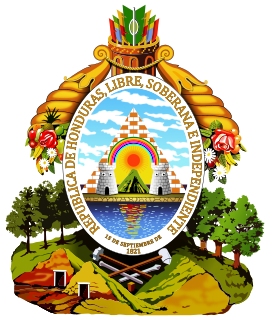
Honduras is divided into 18 departments. Each department is headed by a governor, who is appointed by the President of Honduras. The governor represents the executive branch in the region in addition to acting as intermediary between municipalities and various national authorities; resolves issues arising between municipalities; oversees the penitentiaries and prisons in his department; and regularly works with the various Secretaries of State that form the President's Cabinet. To be eligible for appointment as governor, the individual must a) live for five consecutive years in the department; b) be Honduran; c) be older than 18 years of age and; d) know how to read and write.
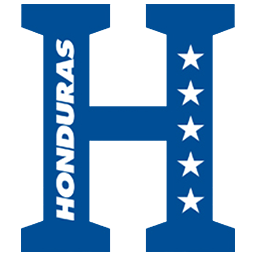
The Honduras national football team represents Honduras in men's international football. The team is governed by the Federación Nacional Autónoma de Fútbol de Honduras (FENAFUTH). They are nicknamed Los Catrachos, La Bicolor or La H.

The National Autonomous Federation of Football of Honduras, known as FENAFUTH, is the official football governing body in Honduras and is in charge of the Honduras national team. FENAFUTH was founded in 1935 and joined FIFA in 1946. It joined CONCACAF in 1961.
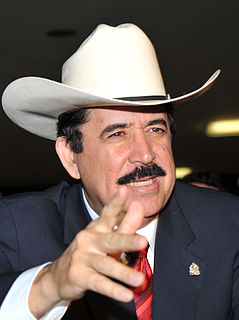
José Manuel Zelaya Rosales is a Honduran politician who was President of Honduras from 27 January 2006 until 28 June 2009. He is the eldest son of a wealthy businessman, and inherited his father's nickname "Mel". Before entering politics he was involved in his family's logging and timber businesses.

Liga Salva Vida is the highest division of football in Honduras. The league season is divided into Opening (autumn) and Closing (spring). One team is relegated to the Liga de Ascenso and one team is promoted from Liga de Ascenso. The top four clubs participate in play-offs to decide the champion. The winners of the Opening and Closing competitions participate in the CONCACAF Champions League.
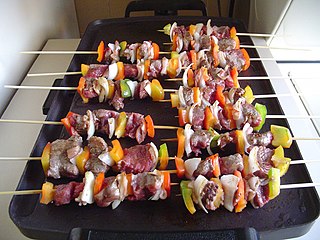
Honduran cuisine is a fusion of Mesoamerican (Lenca), Spanish, Caribbean and African cuisines. There are also dishes from the Garifuna people. Coconut and coconut milk are featured in both sweet and savory dishes. Regional specialties include fried fish, tamales, carne asada and baleadas. Other popular dishes include meat roasted with chismol and carne asada, chicken with rice and corn, and fried fish with pickled onions and jalapeños. In the coastal areas and the Bay Islands, seafood and some meats are prepared in many ways, including with coconut milk.

Honduran Americans are Americans or US citizens of Honduran heritage, who belong to one or more ethnic groups such as Mestizo, White, Lenca, Ladino people, Miskito people, Garifuna, and Creole peoples. The Honduran population at the 2010 Census was 837,694. Hondurans are the eighth largest Hispanic group in the United States and the third largest Central American population, after Salvadorans and Guatemalans.
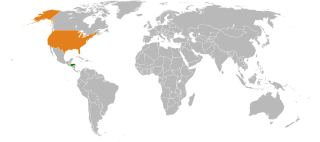
Honduras – United States relations are bilateral relations between Honduras and the United States, who have had formal relations since 1830. There is close cooperation between the two countries, particularly in the areas of the War on Drugs while the National Port Authority in Puerto Cortés is part of the U.S. Bureau of Customs and Border Protection's Container Security Initiative.

The president of Honduras officially known as the President of the Republic of Honduras, is the head of state and head of government of Honduras, and the Commander-in-chief of the Armed Forces. According to the 1982 Constitution of Honduras, the Government of Honduras consists of three branches: Executive, Legislative and Judicial. The president is the head of the Executive branch, their primary duty being to "Execute and enforce the Constitution, treaties and conventions, laws and other legal dispositions." The President is directly elected for a four year term.

The 2009 Honduran coup d'état, part of the 2009 Honduran constitutional crisis, occurred when the Honduran Army on 28 June 2009 followed orders from the Honduran Supreme Court to oust President Manuel Zelaya and send him into exile. Zelaya had attempted to schedule a non-binding poll on holding a referendum on convening a constituent assembly to rewrite the constitution. Zelaya refused to comply with court orders to cease, and the Honduran Supreme Court issued a secret warrant for his arrest dated 26 June. Two days later, Honduran soldiers stormed the president's house in the middle of the night and detained him, forestalling the poll. Instead of bringing him to trial, the army put him on a military aeroplane and flew him to Costa Rica. Later that day, after the reading of a resignation letter of disputed authenticity, the Honduran Congress voted to remove Zelaya from office, and appointed Speaker of Congress Roberto Micheletti, his constitutional successor, to replace him.

Juan Orlando Hernández Alvarado is the President of Honduras, who assumed office on 27 January 2014, after winning the 2013 Honduran general election. He began his second presidential term on 27 January 2018 despite allegations of fraud.

Tegucigalpa, formally Tegucigalpa, Municipality of the Central District, and colloquially referred to as Tegus or Teguz, is the capital and largest city of Honduras along with its twin sister, Comayagüela.
The Honduras national under-23 football team represents Honduras in international football competitions in Olympic Games and Pan American Games. The selection is limited to players under the age of 23, except three over-age players. The team is controlled by the Federación Nacional Autónoma de Fútbol de Honduras (FENAFUTH). Honduras have qualified for five Men's Olympic Football Tournaments, in Sydney 2000, Beijing 2008, London 2012, Rio de Janeiro 2016 and Tokyo 2020.
Miss Honduras is a national beauty pageant in Honduras.

Gender inequality in Honduras has seen improvements in some areas regarding gender inequality, while others have regressed towards further inequality since in 1980s. Comparing numbers from the 2011 and 2019 United Nations Human Development Reports helps to understand how gender inequality has been trending in Honduras. In the 2011 Human Development Report rankings for the Gender Inequality Index, Honduras ranked 121st out of 187 countries. In the 2019 Human Development Report Honduras dropped to 132nd out of 189 countries in the rankings. As the country's overall ranking dropped, it indicates that progress towards gender equality is not being made on the same level as other countries around the world.
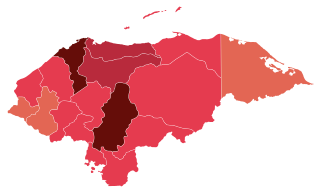
The COVID-19 pandemic in Honduras is part of the worldwide pandemic of coronavirus disease 2019 caused by severe acute respiratory syndrome coronavirus 2. The virus was first confirmed to have spread to Honduras on 10 March 2020, when two women tested positive for the virus after one of them landed on Toncontín International Airport in a flight from Madrid, Spain, and the other on Ramón Villeda Morales International Airport in a flight from Geneva, Switzerland. Confirmed cases have been reported in all 18 departments of the country, with the majority of cases located in Cortés and Francisco Morazán.